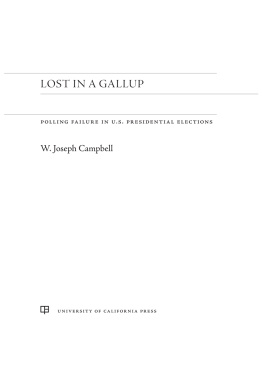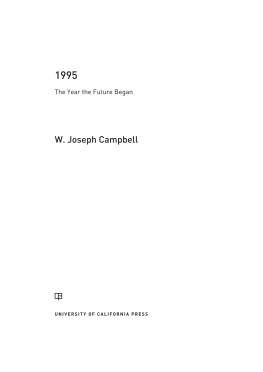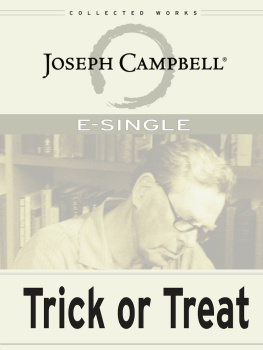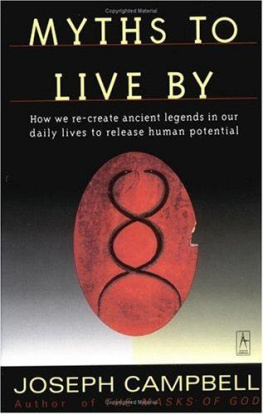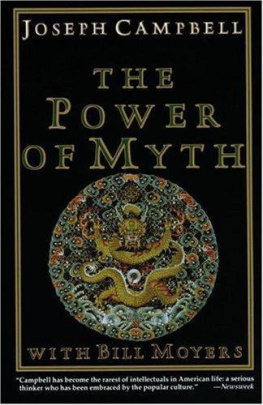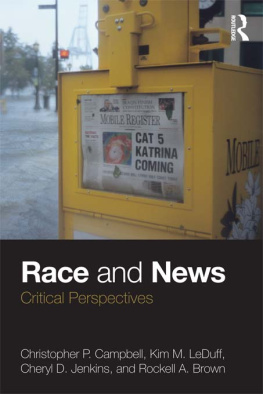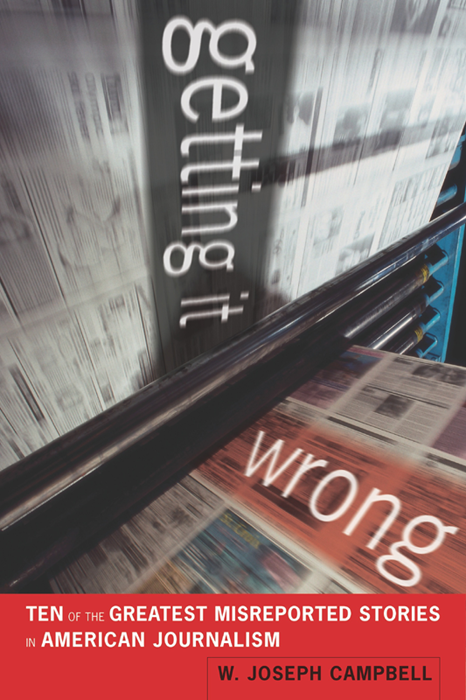W. Joseph Campbell
University of California Press, Ltd.
London, England
2010 by W. Joseph Campbell
Campbell, W. Joseph.
Getting it wrong: ten of the greatest misreported
stories in American journalism / W. Joseph Campbell.
p. cm.
Includes bibliographical references and index.
ISBN 978-0-520-25566-1 (cloth: alk. paper)
ISBN 978-0-520-26209-6 (pbk.: alk. paper)
1. Journalistic ethicsUnited StatesHistory20th
century. 2. JournalismObjectivityUnited States
History20th century. 3. Press and politicsUnited
StatesHistory20th century. 4. Sensationalism in
journalismUnited StatesHistory20th century.
5. JournalismSocial aspectsUnited States
History20th century. I. Title.
PN 4756. C 36 2010
071.30904dc22 2009047705
Acknowledgments
In late summer 2005, Reed Malcolm, a senior acquisitions editor for the University of California Press, asked me by email whether I had ever considered writing a sort of great myths in journalism book. He had found references online to my earlier works, which debunked well-known tales of the yellow press period in late-nineteenth-century American journalism. Reed said he had in mind a readable book geared for a general audience. His query was astonishingand quite coincidental. At the time, I was completing a book about 1897, a decisive year in American journalism. And I was contemplating as my next book project a detailed look at media mythsstories about or by the news media that are widely believed and often retold but which, upon scrutiny, prove to be apocryphal or wildly exaggerated.
So began a collaboration that has resulted in this book. While we had our differences, Reed and his colleagues at the Press were always courteous, helpful, and professional. This book benefited from Reeds enthusiasm, and from the thoughtfulness of his associate, Kalicia Pivirotto. Kate Warne, the books production editor, was a delight to work with.
Madeleine Adams, whom the Press hired to copyedit the final manuscript, did fine work. She called attention to at least a few errors that would have been acutely embarrassing had they not been caught.
I am in the debt of many people for their contributions to this work. My recent graduate assistants at American University devoted significant time, energy, and attention to the media myths project. I thank them all: Andrew Knapp, Mark Syp, and Ryan Sibley. Another former graduate student at American, Neil Hickey, merits special mention. Neil once characterized media-driven myths as the junk food of journalisman inspired turn of phrase that I have borrowed, with his permission. Ruxandra Giura, a talented digital journalist, extended invaluable assistance on this and other projects. I am grateful for her help, especially in the preparation of many of the photographs that appear on these pages.
I am indebted to John Watson, a faculty colleague at American, for helping to make sure that I completed draft chapters in a timely manner. Other faculty colleaguesincluding Larry Kirkman, Rodger Streitmatter, John Doolittle, and Amy Eismanwere generous with their suggestions and their support. Zack Prichard of American extended vital assistance on technical matters.
A great deal of research on this book was conducted at the Newspaper and Current Periodical Reading Room of the Library of Congress, a marvelous place where Georgia Higley, Travis Westly, and their staff provided enthusiastic and tireless support.
I am very grateful to my friends and colleagues of the American Journalism Historians Association, including Michael Sweeney, Fred Blevens, and Tamara Baldwin, for the grant that helped finance research trips to places as diverse as New York City, Atlantic City, and Grovers Mill, New Jersey.
Wally Eberhard, one of the eminent scholars in American journalism history, read an early version of the manuscript and offered important suggestions. So did Don Ross, formerly of the Newseum. I appreciated the insights they shared. Rick Mastroiani and Sage Hulsebus at the Freedom Forum library were invariably welcoming and accommodating on my visits. Lee Ann Potter of the National Archives and Records Administration was generous in making available a front-page image about the famous War of the Worlds radio broadcast of October 1938. Harlen Makemson of Elon University shared thoughtful suggestions about the chapter on the War of the Worlds.
Special thanks go to Paul Merkoski, formerly the editor of the Press of Atlantic City. He couldnt have been more helpful in offering suggestions and leads on the books bra-burning chapter. Paul and the photo editor at Press, Vernon Ogrodnek, made available the image of the demonstration on the Atlantic City boardwalk in September 1968. The bra-burning chapter also benefited from the recollections of Jon Katz and Jack Boucher, both of whom were generous with their time. Heather Halpin Perez of the Atlantic City Free Public Library was very helpful, too. And Tyler Abell shared with me important insights about his stepfather, Drew Pearson.
My very good friend, Hugh D. Pace, always was eager to talk about media-driven myths, and offered a number of interesting suggestions.
My wife, Ann-Marie C. Regan, deserves a special note of thanks. Ann-Marie was patient and accommodating as this book was researched and written. She even put up with my devoting a day of vacation at Key West to pursue a few research-related leads.
Inevitably, writing a book that debunks media myths causes a bit of looking over ones shoulder. If errors appear in this work, they are mine alone.
Introduction
Media myths arent harmless. They can scare people,
reinforce their biases and become tools of manipulation.
Rene Denfeld, Hoodwinked, Sunday [Portland]
Oregonian (March 10, 2002): E1
The New York Sun was one of the great names in American journalism. It was a newspaper that first appeared in 1833, in the vanguard of dailies that sold for a penny. For many years it was edited by Charles A. Dana, a prickly force in nineteenth-century journalism who taunted rival editors in print while cultivating the Suns reputation as a writers newspaper.


